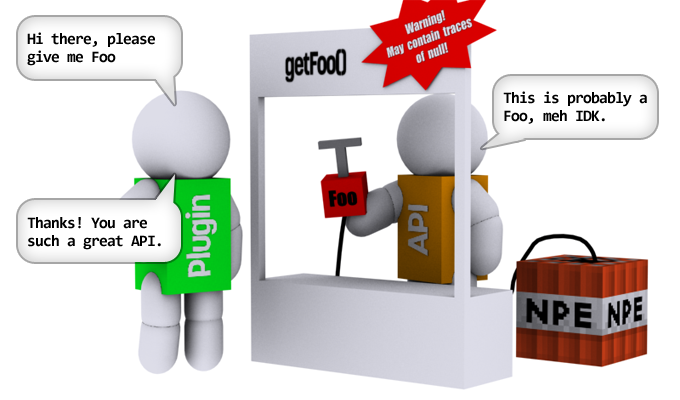Optionals Explained
Much of the Sponge API makes use of Java’s Optional system on object accessors, but if you’ve never used Optional
before this might seem like a bit of a peculiar way of doing things. You might be tempted to ask:
“why do I need to perform an extra step when fetching something from an API object?”
This section gives a brief summary of Optional and explains how - and perhaps more importantly why -
it’s used throughout the Sponge API.
Let’s start with a little history, and look at how accessors - particularly “getters” - typically work when not making
use of Optional.
1. Implicit Nullable Contracts and Why They Suck
Let’s say we have a simple API object Entity with a getFoo() method which returns the Entity’s Foo.

In the olden times of yore, our plugin might fetch and use the Foo from the entity using the getter like this:
public void someEventHandler(Entity someEntity) {
Foo entityFoo = someEntity.getFoo();
entityFoo.bar();
}
The problem arises because - when designing the API - we have to rely an implicit contract on the getFoo method
with respect to whether the method can (or cannot) return null. This implicit contract can be defined in one of
two ways:
In the javadoc - this is bad because it relies on the plugin author reading the javadoc for the method, and the contract may not be clear to the plugin author
Using nullable annotations - this is not ideal because in general these annotations require a tool to be of any use, for example relying on the IDE or compiler to handle the annotations.

Let’s assume that the getFoo() method can - as part of its contract - return null. This suddenly means that our
code above is unsafe as it may result in a NullPointerException if entityFoo is null.
public void someEventHandler(Entity someEntity) {
Foo entityFoo = someEntity.getFoo();
entityFoo.bar();
}
Let’s assume our plugin author is savvy to the nullable nature of our getFoo method and decides to fix the problem
with null checking. Assuming they have defined a local constant Foo, the resultant code looks like this:
public void someEventHandler(Entity someEntity) {
Foo entityFoo = someEntity.getFoo();
if (entityFoo == null) {
entityFoo = MyPlugin.DEFAULT_FOO;
}
entityFoo.bar();
}
In this example, the plugin author is aware that the method can return null and has a constant available with a
default instance of Foo which can be used instead. Of course the plugin could just short-circuit the call entirely,
or it could attempt to fetch Foo from somewhere else. The key message is that handling nulls even in simple cases
can lead to spaghetti code quite quickly, and moreover relies on the plugin author to explicitly visit the method’s
contract to check whether a null check is necessary in the first place.
That’s not the only drawback however. Let’s consider the API over the longer term and assume that at the time the author
writes their plugin, they visit the method javadoc and see that the method is guaranteed to never return null
(since every Entity always has a Foo available). Great! No convoluted null check required!
However, let’s now assume that in a later version of the game, the game developers remove or deprecate the concept of
Foo. The API authors update the API accordingly and state that from now on the getFoo() method
can return null and write this into the method javadoc. Now there’s a problem: even diligent plugin authors who
checked the method contract when they first wrote their code are unwittingly handling the method incorrectly: with no
null check in place any code using the Foo returned from getFoo is going to raise an NPE.
Thus we can see that allowing implicit nullable contracts leaves us with a selection of pretty awful solutions to choose from:
Plugin authors can assume that all methods may return null and code defensively accordingly, however we’ve already seen that this leads to spaghetti code pretty quickly.
The API authors can define an implicit nullable contract on every API method, in an attempt to make null handling the plugin author’s problem, which only exacerbates the previous problem.
The API authors can assert that any implicit nullable contract they define will never be altered going forwards. This means that in the eventuality that they need to handle the removal of a feature from the base game then they must either:
Throw an exception - hardly elegant but certainly easier to diagnose than a loose NPE which may be triggered elsewhere in the codebase and be hard to track down
Return a “fake” object or invalid value - this means that consuming (plugin) code will continue to work, but creates an ever-increasing burden on the API developers going forward since every deprecated feature will require the creation of yet more fake objects. This could soon lead to the situation where a big chunk of the API is filled with junk objects whose only purpose is to support parts of the API which are no longer in service.
It should be pretty clear by now that there are some sizable headaches attached to implicit nullable contracts, made all the more poignant when the API in question is a layer over an extremely unstable base product. Fortunately, there is a better way:
2. Optional and the Explicit Nullable Contract
As mentioned above, APIs for Minecraft are in a difficult situation. Ultimately they need to provide a platform with a reasonable amount of implied stability atop a platform (the game) with absolutely no amount of implied stability. Thus any API for Minecraft needs to be designed with full awareness that any aspect of the game is liable to change at any time for any reason in any way imaginable; up to and including being removed altogether!
This volatility is what leads to the problem with nullable method contracts described above.
Optional solves the above problems by replacing implicit contracts with explicit ones. The API never advertises, “here is your object, kthxbai”, instead it presents accessors with a “here is a box which may or may not contain the object you asked for, ymmv”.

By encoding the possibility of returning null into an explicit contract, we replace the concept of
null checking with the more nuanced concept of may not exist. We also stipulate this contract from day one.
So what does this mean?
In a nutshell, no longer do plugin authors have to worry about the possibility of null being returned. Instead the
very possibility of a particular object not being available becomes encoded in the very fabric of their plugin code.
This has the same level of inherent safety as constantly performing null-checks, but with the benefit of much more
elegant and readable code in order to do so.
To see why, let’s take a look at the above example, converted to use a getFoo method which returns
Optional<Foo> instead:
public void someEventHandler(Entity someEntity) {
Optional<Foo> entityFoo = someEntity.getFoo();
if (entityFoo.isPresent()) {
entityFoo.get().bar();
}
}
You may note that this example looks very much like a standard null-check, however the use of Optional actually
carries a little more information in the same amount of code. For example, it is not necessary for someone reading
the above code to check the method contract, it is clear that the method may not return a value, and the handling
of the value’s absence is explicit and clear.
So what? Our explicit contract in this case results in basically the same amount of code as a null check - albeit one that is contractually enforced by the getter. “Whoop de do,” you say, “so what?”
Well the Optional boxing allows us to take some of the traditionally more awkward aspects of null-checking and make them more elegant: consider the following code:
public void someEventHandler(Entity someEntity) {
Foo entityFoo = someEntity.getFoo().orElse(MyPlugin.DEFAULT_FOO);
entityFoo.bar();
}
Hold the phone! Did we just replace the tedious null-check-and-default-assignment from the example above with a single line of code? Yes indeed we did. In fact, for simple use cases we can even dispense with the assignment:
public void someEventHandler(Entity someEntity) {
someEntity.getFoo().orElse(MyPlugin.DEFAULT_FOO).bar();
}
This is perfectly safe provided that MyPlugin.DEFAULT_FOO is always available.
Consider the following example with two entities, using an implicit nullable contract we want to use Foo from the
first entity, or if not available use Foo from the second entity, and fall back on our default if neither is
available:
public void someEventHandler(Entity someEntity, Entity entity2) {
Foo entityFoo = someEntity.getFoo();
if (entityFoo == null) {
entityFoo = entity2.getFoo();
}
if (entityFoo == null) {
entityFoo = MyPlugin.DEFAULT_FOO;
}
entityFoo.bar();
}
Using Optional we can encode this much much more cleanly as:
public void someEventHandler(Entity someEntity, Entity entity2) {
someEntity.getFoo().orElse(entity2.getFoo().orElse(MyPlugin.DEFAULT_FOO)).bar();
}
This is merely the tip of the Optional iceberg. In java 8 Optional also supports the Consumer and
Supplier interfaces, allowing lambas to be used for absent failover. Usage examples for those can be found on the
Usage Examples page.
Note
Another explanation on the rationale behind avoiding null references can be found on
Guava: Using And Avoiding Null Explained.
Beware that the guava Optional class mentioned in the linked article is different from java’s
java.util.Optional and therefore will have method names different from those used here.